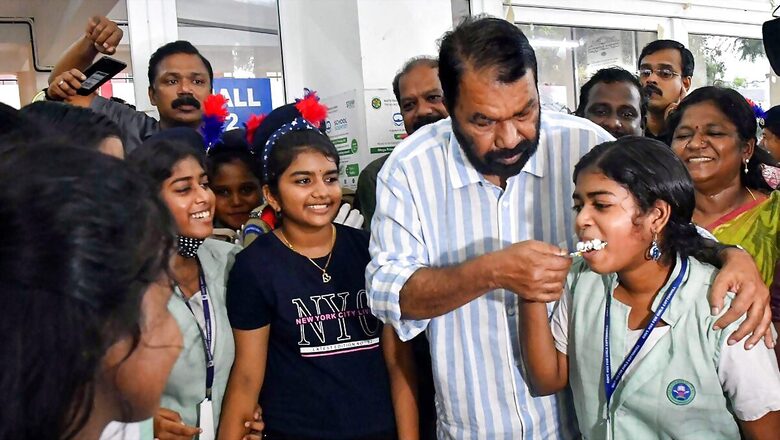
views
The Kerala education department is set to roll out supplementary textbooks for classes XI and XII in September, which will have the portions recently deleted by the National Council for Educational Research and Training (NCERT) as part of its “syllabus rationalisation” process.
Kerala Education Minister V Sivankutty announced on Saturday that the department will distribute supplementary textbooks for these classes from next month. Kerala, like several other southern and Opposition-ruled states, has been at the odds with the Centre over the recent deletions from the textbooks as well as on many provisions laid out in the Prime Minister Narendra Modi-led NDA government’s new National Education Policy (NEP) 2020.
Can Kerala do this?
Under the constitution, states can choose not to adopt the policies or curriculum designed by the Centre either fully or partially, as education is a subject under the concurrent list. Under the list, both the Parliament and the state assemblies having the power to legislate over affairs including education.
Though the centre has the supremacy over the state assemblies in this regard, states are free to draw up their own curriculum and print their own textbooks.
The deletions from NCERT textbooks that came into effect this April included chapters and portions from sociology, history, political science and economics. The deletions included references to Mahatma Gandhi’s assassination by Nathuram Godse, Mughal courts, 2002 Gujarat riots, cold war era and rise of Islamic empires in Afro-Asian territories, among others.
Kerala education minister said that the supplementary textbooks will include all the deleted portions. While the deletions were carried out across textbooks from classes XI to XII, the state was affected by the senior secondary textbooks, as it already prepares its own textbooks for classes up to 10th standard.
Also, the Kerala State Council of Educational Research and Training (SCERT) is developing a whole new curriculum for school education, which is not fully in line with the NEP. Sivankutty had recently announced that the state has already started preparing its own curriculum framework through a process of popular discussions and debates. The NEP, which envisages changes in both pedagogy, curriculum and structure of school education, itself allows 20% latitude in adapting to the policy as per state requirements.
According to experts, even during the Congress rule when the 1986 education policy was formulated, many states opposed it and even passed resolutions against the policy. NEP 2020, which replaces the 1986 education policy, is a guiding principle for a paradigm shift in education.
States not fully implementing NEP
Several southern states including Kerala, Tamil Nadu and Karnataka as well as others like West Bengal have not adopted the new education policy in its entirety and are rather against some of its provisions including the three-language formula, which envisages teaching Hindi as the second language besides English in non-Hindi speaking states.
Meghalaya government didn’t oppose the policy, but added that there were several “challenges” in its implementation, which it will take time to resolve.
While Kerala opposed the policy saying it was “too centralised” that went against popular concerns, Tamil Nadu government led by DMK too announced last year that it will not implement NEP and instead set up a panel to draw up a new state education policy.
Tamil Nadu Chief Minister MK Stalin has been against the NEP and had termed it as a policy for the “elites”. He has reservations against the three-language policy and the prominence given to Sanskrit over Tamil and other old languages.
Stalin is also against NEET, the national entrance exam to government medical colleges and on Monday wrote to President Droupadi Murmu to scrap the exam, which he says “favours urban students who can afford costly coaching classes”. His government had even moved an anti-NEET legislation in the state assembly in 2021.
Similarly, Congress-led Karnataka state education department has decided not to adopt the policy, terming it “incompatible” with the federal system of governance. Karnataka CM Siddaramaiah during a general body meeting of the state unit on Monday said that NEP will be scrapped from next year in the state and will instead be replaced by a State Education Policy (SEP).
The Congress in its manifesto for assembly elections had resolved to scrap NEP, which will be done from next year. Recently in the state assembly too, the CM had said that the Centre’s new education policy has several “anomalies” and that a uniform education system does not suit a country like India, which has diverse religions, cultures and languages.
West Bengal led by TMC government has also set up a committee to “examine” the NEP 2020 and has not been responding to the Centre’s direction to all states to share updates on implementation of the new policy.












Comments
0 comment